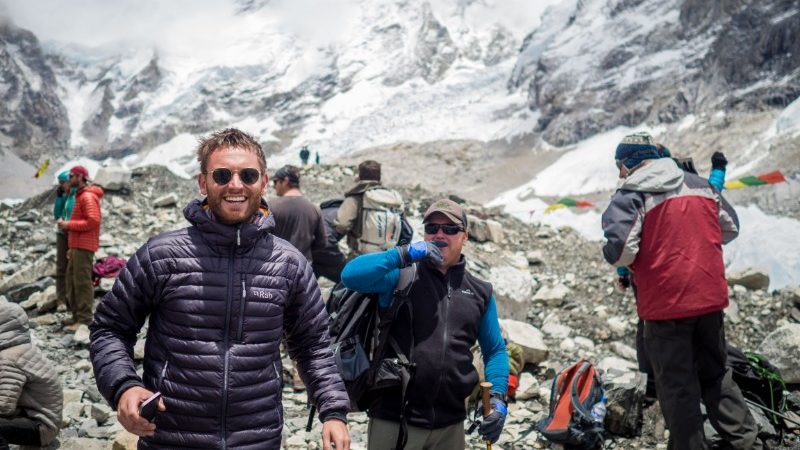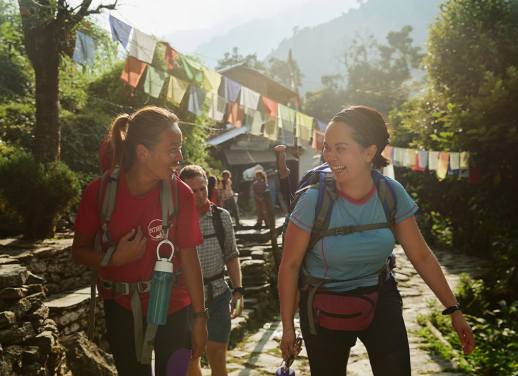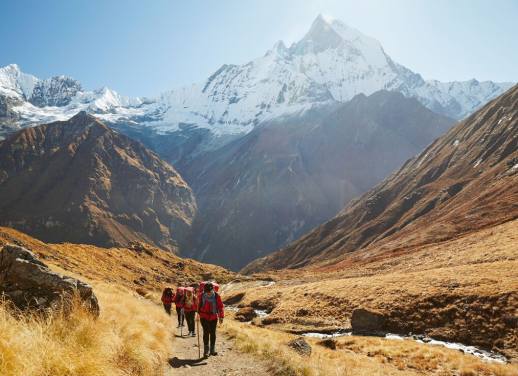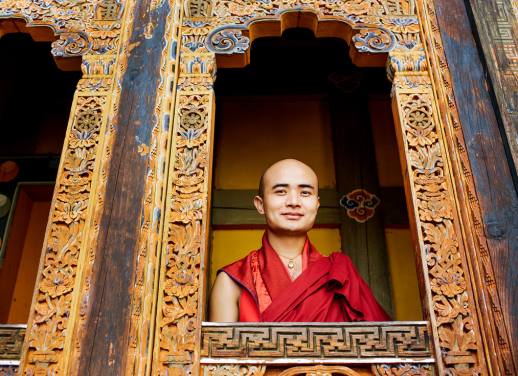The Himalayas have long bridged the extremes of outstanding natural beauty and exhilarating adventure.
They are home to all 14 of the world’s 8000m-plus peaks, an impressive array of wildlife and for fans of folklore the fabled Yeti. The sheer cliffs and lush valleys are a draw for athletes, nature lovers, artists, scientists or those who just want to try their hand, or more accurately their feet, at something new.
Whether an experienced trekker or first timer we’ve got your back. With the help of this guide, calls of “I wish I’d thought of that!” and “what a great idea!” will follow you all the way up to Base Camp.
Before you go
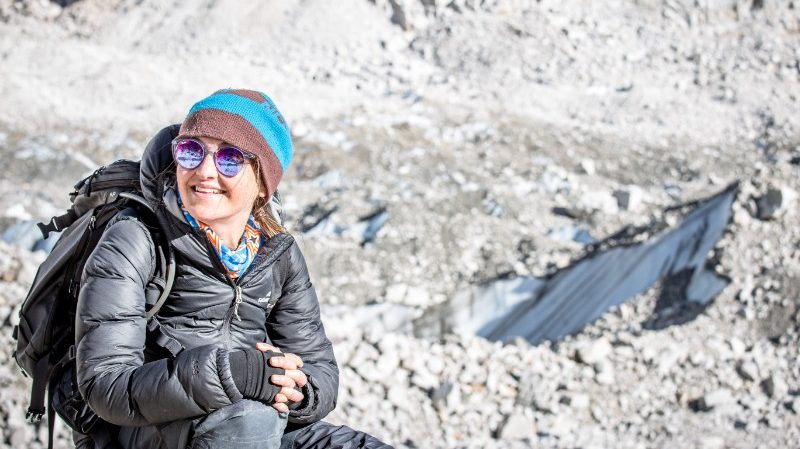
Take a break whenever you need one. Image by Lucy Piper.
It’s important to know what you’re in for. Trekking to Everest Base camp without any preparation is not the best idea…
I think I can, I think I can
You can! Contrary to popular belief, you don’t have to have fitness levels equal to Usain Bolt to tick this off your bucket list. People from all walks of life complete this trek. Although no prior trekking experience is required it’s great fun to give it a go before you make the journey to Nepal, where you’ll be walking between four to eight hours per day. Try day hikes, hitting the gym or taking the stairs instead of the elevator at uni.
CHECK OUT INTREPID’S RANGE OF NEPAL TRIPS
The time is right
The two best seasons for trekking in Nepal are Spring (February to end of May) and Autumn (September to November). The weather is generally dry during these periods, providing ideal conditions to take in the spectacular scenery.
AMS (Altitude Mountain Sickness)
Also known as altitude sickness, AMS is caused by gaining altitude too rapidly and can be a real trip-ruiner. A little pre-travel preparation, however, can keep you feeling good.
Perhaps the most important thing to note is that any illness at altitude, be it headache or nausea, should be treated as altitude sickness until proven otherwise.
The definitive treatment to AMS is descent but you can help prevent its onset by climbing slowly and gradually, staying hydrated and wearing adequate warm clothing and sunglasses.
It may be worth checking in with your doctor before you go for advice on preventative medications. Your guides are highly experienced and will carry all the high altitude safety equipment to assist you if you experience any discomfort.
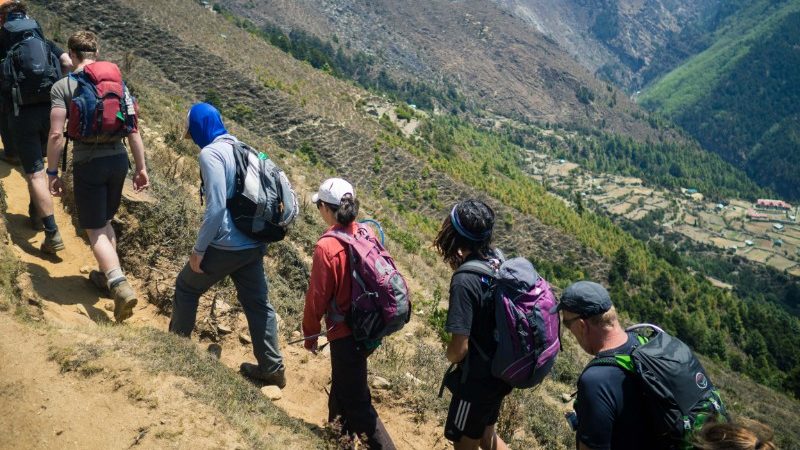
Trekkers at Everest Base Camp. Image by Kieran Wallace.
Keep it Light
Before you ask your friend to sit on your pack while you zip it up, think of yourself and the porters, who will be carrying it throughout the trek. On Intrepid trips, trekkers are required to limit their pack weight to 12kg, to ensure the porters will not be carrying more than 20kg, including their own belongings. Packs are actually checked by independent rangers to ensure the porters are not carrying weight over the limit, so it’s best to keep it light. This is in line with Intrepid’s responsible travel Porter Policy.
SUBSCRIBE TO OUR NEWSLETTER FOR THE LATEST TRAVEL OFFERS, NEWS AND COMPETITIONS
General trekking gear:
- Well broken in hiking boots: Sore feet can be as much of a trip ruiner as AMS
- Hiking trousers and hiking shorts
- Leggings or thermals
- Trekking shirts: choose materials that dry quickly
- Raincoat and/or windbreaker
- Warm, waterproof jacket
- Fleece Jacket
- Headwear: Beanies and sun hats are essential
- Sunglasses: A good pair are a necessity due to the higher strength of UV at altitude.
- Gloves
- Hiking poles
- Head torch
- Reusable water bottle
- Microfibre towel
Note: Layers are key. They prepare you for changes in weather and altitude. Start with your base layer, a hiking top, chuck a polar fleece for insulation over that, and then throw on your puffy down jacket for layer three.
Toiletries and first aid
Aside from the basics consider bringing:
- First aid kit: fill it with chewable vitamins, electrolytes for hydration, painkillers, athletic tape, throat lozenges and blister blockers.
- Sunscreen and lip balm to combat the UV.
- Steripen: a Steripen is an investment worth making, it purifies water so it is safe for drinking and helps keep single-use plastic to a minimum.
RELATED: WHAT TO EXPECT ON A TREK TO EVEREST BASE CAMP
During the trek
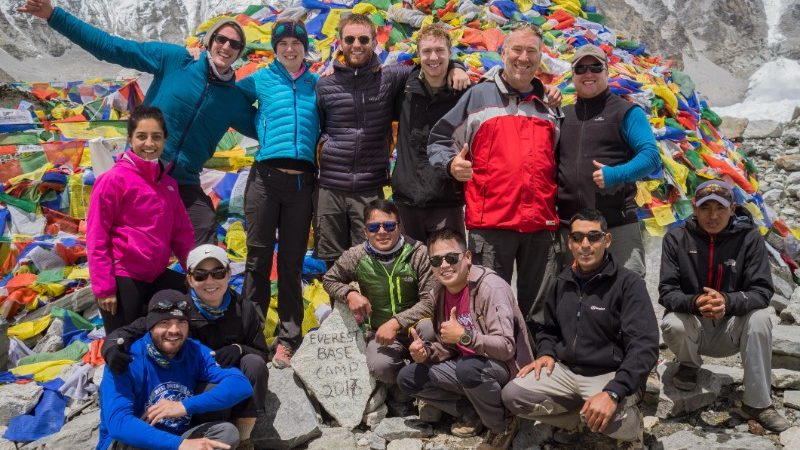
Victory! Image by Kieran Wallace.
Bistari! Bistari! (slowly, slowly)
Your hiking poles are not for poking people in front of you as a signal to “hurry up”. Slow and steady beats off altitude sickness. Take your time, take your photos and chomp on your snacks: trail mix, muesli bars and a little bit of chocolate never hurt anyone.
Respect
We always want to show respect to local cultures when travelling. Here are five tips for thoughtfulness and consideration while heading to Base Camp.
- Never litter: carry a rubbish bag for yourself and others and dispose of all rubbish correctly.
- Always walk to the left of stupas, gompas and mani stones: This shows respect to the Buddhist religion.
- Take some time before your trek to learn some local history and maybe put a phrase book on your kindle to practice what you learn with your guides and people you meet.
- Allow pack animals the right of way. Never get on a swinging bridge with something bigger than a dog (trust me with this one).
- Always ask before taking photos of locals and avoid taking photos of children.
But most importantly, come with a great attitude, an open mind and share your trail snacks with people – it’s a sure way to make friends.
Are you ready to tackle Base Camp? Book a small group trip with Intrepid and you can.
Hero image by Kieran Wallace.

